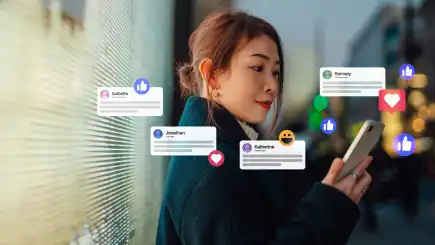Learn about media with online courses and programs
What is media?
When you watch a movie, read a newspaper, or visit a website, you’re interacting with media. At its core, media is an umbrella term encompassing different means of communications and the channels through which information, entertainment, and messages are transmitted to an audience.
Media has the power to influence public opinion and culture. Because of this, it’s important to be able to navigate media responsibly. Even young children can benefit from strong media literacy skills. By learning how to interpret and communicate information effectively, students can become more informed citizens and strengthen their future career prospects.
No matter who you are, you can benefit from media studies. Educators and parents can also explore courses that explain how to teach media literacy to young students. With edX, you can find classes that align with your learning goals.

Browse online media courses
Media course curriculum
There are many aspects involved in responsible media literacy. Depending on your age and stage in your education or career, you might look for classes that cover the following topics:
Media analysis
Source evaluation
Fact-checking
Digital citizenship
Media types
Learning media literacy can also help build important interpersonal and soft skills, such as critical thinking and listening, ethics, and communication. As new media types emerge and existing media evolves, you can continue to develop new skills appropriate to those changes.
Learning about how to become media literate can supplement your knowledge across many different topics and fields. edX offers a variety of educational opportunities for learners interested in studying these topics, as well as a host of other disciplines. A boot camp can provide flexible, hands-on learning for those who want to upskill quickly, while executive education courses are designed for busy professionals. You can also pursue a more comprehensive curriculum in a bachelor’s degree or, for more advanced learners, a master’s degree. Find the right learning path for you.
Explore jobs in media
Media literacy is important across many jobs and industries. However, there are roles that work more closely with media and media outlets and may require a more in-depth skill set. These include:
Journalist: Uses media literacy to critically evaluate sources, fact-check information, and present news in an accurate and unbiased manner.Footnote 1
Digital marketer: Benefits from media literacy by understanding how online platforms work and how to engage audiences effectively.Footnote 2
Librarian: Applies media literacy skills to help patrons access and evaluate information and guide users in finding credible and reliable sources.Footnote 3
Lawyer: Needs media literacy skills to evaluate evidence, identify biases in media coverage of legal cases, and communicate effectively with the public and the media.Footnote 4
Cybersecurity specialist: Uses media literacy to educate individuals and organizations about online threats and best practices for protecting personal information.Footnote 5
Each of these roles will have different education and skills requirements. For example, you may be able to build relevant skills in a cybersecurity boot camp. However, some employers may seek candidates with a degree in journalism, depending on the role. Before deciding on a specific learning path, research the positions you hope to pursue and align your coursework with your career goals.
